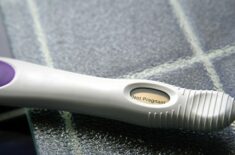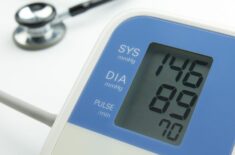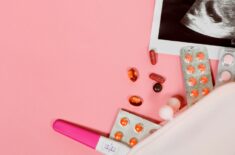Overview
Did you know that more than 35% of pregnant women in the US are deficient in iodine and don’t even know it? (1)
That’s alarming because iodine deficiency could lead to higher risks of:
- serious medical issues for pregnant women and their unborn children
- intellectual disability
- low birth weight
- miscarriage, stillbirth, and infant mortality
A study published in Clinical Thyroidology showed that higher iodine intake in women before pregnancy might be associated with increased IQ in children 6 to 7 years old. (2)
Iodine is an essential nutrient, especially in pregnancy, but how do you know if you’re iodine deficient or not?
To learn everything about how to get adequate iodine intake in pregnancy, just keep reading.
Why Is Iodine Important In Pregnancy?
Iodine is an essential micronutrient that every person needs in order to survive, not just pregnant women. It plays an important role in thyroid health and in maintaining a healthy pregnancy.
The thyroid gland is a small, butterfly-shaped organ located at the base of your neck.
This gland produces the thyroid hormones T3 (triiodothyronine) and T4 (thyroxine); it turns out that your body actually needs iodine in order to produce these hormones.
According to the Hormone Health Network, these hormones are essential for the following functions: (3)
T4
- Helps regulate metabolism
- Helps regulate body temperature
- Affects mood
T3
- Fetus’ brain development
- Control of the body’s metabolic rate
- Promotion of normal growth in children
- Help in various functions of the cardiovascular system, reproductive system, and central nervous system
- Muscle control
- Maintenance of bone health
This is why it’s crucial for everyone, children and adults alike, to maintain adequate iodine levels in the body.
The ATA (American Thyroid Association) recommends the following daily dietary allowance for iodine in micrograms (mcg): (4)
- Birth to 6 months: 110 mcg
- Infants 7 to 12 months: 130 mcg
- Children 1 to 8 years: 90 mcg
- Children 9 to 13 years: 120 mcg
- Teens 14 to 18 years: 150 mcg
- Adults: 150 mcg
Can You Use Iodine While Pregnant?
Many women wonder, “Do I need iodine in pregnancy?”
The answer is a resounding yes!
Remember that iodine is essential for your baby’s neurodevelopment.
Moreover, iodine deficiency often leads to serious health issues in both mothers and babies.
So, you want to ensure that you’re getting all the iodine you need for a healthy pregnancy. (5)
When Is Iodine Most Important During Pregnancy?
During pregnancy, maternal iodine requirements increase by at least 50% because a good portion of the mother’s intake goes directly to the baby.
In a 2011 study in the Journal of Thyroid Research, researchers discovered that iodine requirements increased by at least 50%, particularly in the first trimester. This was manifested as a 50% increase in the production of T4. (6)
This increased production of thyroid hormones means that your body also needs more iodine.
Other factors also lead to an increase in iodine requirements during pregnancy.
Until around 20 weeks of gestation, your baby depends on the maternal transfer of T4. (7)With maternal T4 being the only thyroid hormone capable of traversing the placenta in small amounts, this must be enough to meet your unborn child’s metabolic needs.
Even when normal fetal thyroid gland function is established, you’ll need to continue providing enough supply of iodine that both you and your child can use. (6)
How Much Iodine Do You Need In Pregnancy?
Did you know that higher iodine intake in moms even before pregnancy may be linked to a higher IQ in children 6 to 7 years old? (2)
Even more reason to make sure you have optimal iodine nutrition, before conception.
Iodine status data from the National Health and Nutrition Examination Survey (NHANES) collected from the US adult population from 2005 to 2008 showed that iodine intake has significantly decreased since the 1970s by as much as 50%. (7)
This decreased intake led to over 35% of pregnant women suffering from iodine deficiency in the US.
The recommended dietary allowances for iodine are as follows: (4)
- Pregnant women: 220 mcg
- Lactating women: 290 mcg
However, the International Council for the Control of Iodine Deficiency Disorders (ICCIDD), United Nations Children’s Fund (UNICEF), and World Health Organization (WHO) recommend that pregnant women take 250 mcg per day. (8)
Can You Get Sufficient Levels Of Iodine From Food?
Thankfully, proper nutrition helps prevent iodine deficiency.
There are plenty of iodine-rich foods to choose from. (More on this below.)
Eating these natural sources of iodine regularly may help you easily reach the recommended daily dietary allowance.
While ample supply of iodine is hardly a problem for many pregnant women who have access to iodine-rich food sources, those living in iodine-deficient areas struggle with getting enough of this micronutrient from their food.
Take note that most fruits and vegetables usually have low iodine content, except those cultivated in lands with high mineral concentrations. (8)
Here’s good news: you can get a lot of iodine from seaweed.
It’s good to know that eating 10g of dried seaweed such as nori can provide you with as much as 232 mcg per serving. That’s 155% of the daily recommendation!
You can also get as much as 158 mcg of iodine, around 106% of the daily recommendation, from 3 oz of baked cod. (But stick to the recommended weekly amounts of this low-mercury fish and don’t overdo it.)
Keep reading for a detailed list of high-iodine foods to include throughout your pregnancy.
A Note On Iodized Salt
A lot of foods are rich in iodine, but not all have enough iodine content to meet the daily recommendations. (4)
For example, salt is known as a common source of iodine. However, many salt products sold today actually lack iodine. Check the label the next time you head off to the grocery store.
Additionally, the iodine content in iodized salt tends to decline with storage, particularly in high-humidity areas.
Even in areas with just 50% relative humidity, the salts tested in a study published in The Food & Nutrition Bulletin lost all iodine content after six months of storage. (9)
Since the 1920s, voluntary salt iodization has helped eliminate iodine deficiency in the US, UK, and Australia reports a 2013 study on The Lancet. (10)
According to a 2016 study, severe thyroid malnutrition has been addressed worldwide through salt iodization. (11)
Countries like the US have salt-iodization programs. But a 2008 study by Dasgupta and Dyke showed that 53% of the salt brands they tested had iodine content below FDA (Food and Drug Administration) recommendations. (12)
Moreover, there are still regions where iodization of the salt supply remains low or not feasible, as shown in data collected by the Iodine Global Network. In these areas, iodine deficiency remains a big problem, but increased intake of foods rich in this micronutrient and taking potassium iodide supplements could solve the problem. (13)
However, a systematic review by Glinoer in the Journal of Public Health Nutr reminded us that salt should not be the primary source of iodine for pregnant and breastfeeding women because there may be a need to limit salt intake during these times. (14)
Is Iodine Supplementation Necessary?
Because not everyone has access to these iodine-rich foods, iodine supplements can help provide pregnant women with the optimal iodine levels needed for a healthy pregnancy.
The ATA (American Thyroid Association) recommends that pregnant women take 150 mcg potassium iodide supplements per day. (15)
While most prenatal vitaminsand multivitamin sources should contain the recommended amount of iodine, data from the Dietary Supplement Label Database suggests that concentrations vary per brand, and not all prenatal vitamins are the same. (16)
So, it’s best to check the label on your prenatal bottle to be 100% sure.
Iodine-Rich Foods
Here are the best dietary iodine sources to start adding to your diet now:
- Low-mercury fish and seafood such as cod and shrimp
- Seaweed such as nori, kelp, and dulse.
- Eggs
- Beef liver
- Dairy products like yogurt, cheese, and kefir
- Iodized salt
- Bread made with iodate dough conditioner
Foods low on iodine include:
- Most fruits and vegetables
- Processed foods
The Effects of Iodine Deficiency In Pregnancy
Normal fetal development requires an adequate supply of thyroid hormones.
According to a study by Zimmermann, iodine deficiency can lead to hypothyroidism for both the mother and baby. (17)
It can also impact the baby’s neurological development.
The study explained that severe iodine deficiency in pregnancy could lead to cretinism, a condition that causes learning disabilities, intellectual disability, and physical deformity.
It could also lead to developmental delays and other abnormal features.
Cretinism is the most severe manifestation of iodine deficiency during pregnancy.
Aside from these, a 2020 study published in the Frontiers of Endocrinology Journal pointed out that severe deficiency of iodine in pregnancy could also lead to the following: (18)
- Increased infant mortality
- Reduced birth weight
- Spontaneous abortion or pregnancy loss
- Neonatal hypothyroidism
Further, low iodine could also lead to repeated reproductive failure, such as repeated miscarriages and stillbirths.
In a 2000 study involving 4,980 women in iodine-deficient Senegal, West Africa, the prevalence of iodine deficiency in the locality indicated a significant effect on fertility rates and pregnancy outcomes. (19)
According to 2016 research, severe iodine deficiency may also lead to: (11)
- Maternal and fetal hypothyroidism
- Stunted growth
- Cretinism
- Irreversible brain damage and intellectual disability
With over 2.2 billion people at risk due to inadequate iodine intake, it’s among the most critical micronutrient deficiencies affecting the world today, reports a 2008 study in J Clin Endocrinol Metab (20)
But pregnant women, lactating mothers, and their babies are among the most vulnerable to the adverse effects of iodine deficiency(5)
The WHO (World Health Organization) warns that the effects of severe iodine deficiency on a child’s intellectual capacity can also lead to possible problems later in life with school and work. (21)
However, little is known about the possible effects of the father’s low iodine levels on child development. (22)
Who’s At Risk Of Iodine Deficiency?
Pregnant moms are also more likely to have moderate iodine deficiency if they:
- Take prenatal vitamins without iodine or containing sub-par levels
- Don’t supplement with iodine at all
- Had thyroid problem before conception
- Consume high amounts of soy products
- Smoked cigarettes before conception
- Don’t consume iodine-rich foods
- Have food allergies that impede the intake of iodine-rich foods
- Follow a vegan or vegetarian diet
- Are exposed to high levels of environmental chemicals like BPA, tobacco smoke, and flame retardants
- Eating foods rich in goitrogens such as raw broccoli, cabbage, kale, brussels sprouts, and radishes because these can affect thyroid function (Cooking or fermenting these vegetables might solve this problem)
- Don’t use iodized salt
With iodine being so essential and iodine deficiency dangerous to mama and child, registered dietitian and author of ‘Real Food For Pregnancy,’ Lily Nichols recommends thorough thyroid screening for women planning to conceive and pregnant moms.
She says: (23)
“As with many health conditions, prevention is king, meaning if you’re planning a pregnancy, get your thyroid screened prior to conception.
If you’re already pregnant, have your thyroid tested as soon as possible…
According to some research, lack of nausea or morning sickness in the first trimester can be a sign of underactive thyroid and/or iodine deficiency.”
The amount of iodine may be measured in terms of UIC (urinary iodine concentration) as part of thyroid screening.
Can You Have Too Much Iodine?
Iodine in excess amounts, measured as median urinary iodine concentration, can also have adverse effects on the body.
The body doesn’t produce iodine, so potential causes of high iodine levels can include:
- Too much iodine in food
- Too much supplemental iodine
A controlled animal study found that rats exposed to excessive amounts of iodine experienced hypothyroidism. They also discovered that this led to a defect in iodide (a form of iodine) transfer to the milk. (24)
Although there’s no question that it’s vital in the body, having too much iodine can also be detrimental to a person’s health.
What Are The Symptoms Of Too Much Iodine?
The Hormone Health Network explains that excessively high levels of thyroid hormones, particularly T3, can harm the body and may lead to: (3)
- Hair thinning
- Irritability
- Tiredness or body malaise
- Irregular menstrual cycle
- Palpitations
- Increased appetite
- Weight loss
- Benign tumor
- Inflammation of the thyroid
- Thyroid dysfunction
- Thyroid disease
A study by Leung, Pearce, and Braverman et al. showed that high iodine intake could also lead to: (5)
- Thyroid papillary cancer
- Thyroiditis
- Other symptoms similar to iodine deficiency, including elevated TSH levels and goiter
Hyperthyroidism (high iodine levels) can cause the following:
- Premature birth
- Miscarriage
- Low birth weight
How Much Iodine Is Too Much In Pregnancy?
The AAP (American Academy of Pediatrics) states that pregnant women’s daily intake should not exceed 1100 mcg daily, while the US Institute of Medicine recommends an upper limit of 600 mcg daily. (25)
Iodine and Breastfeeding
Iodine is also beneficial postpartum in lactation. Just like inside the womb, your lactating infant’s sole source of iodine is through your breast milk.
Clinical trials show that the amount of iodine in breast milk largely depends on the mother’s intake of iodine-rich food. (26)
Your baby may get adequate iodine from your breast milk if you can consume enough to reach the recommended daily level of at least 250 mcg.
And what about formula-fed babies?
Did you know that most formula milk only contains low levels of iodine?
A study using 32 brands of formula milk used in Spain and 127 brands in other countries showed lower levels of iodine than breast milk. (27)
Weaning toddlers are at a higher risk of mild iodine deficiency, even in countries with established salt-iodization programs. (28)
A 2013 meta-analysis showed that children five years old and below could lose as much as 7.4 IQ points due to iodine deficiency. (29)
That’s something that moms like us don’t want to happen with our children, right? Remember that the best weaning foods would include iodine-rich choices for your toddler’s optimal nutrition. So moms, make sure your kiddos get plenty of these foods on their plates.
Why Is Iodine Bad For Pregnancy?
Iodine is good for pregnancy, but too much of it may cause hypothyroidism (the thyroid gland doesn’t create enough thyroid hormones) and goiter (enlarged thyroid gland) in your baby. The condition can affect your child’s health and interfere with breathing. (30)(31)
REFERENCES
(1) Caldwell KL, Makhmudov A, Ely E, Jones RL, Wang RY. Iodine status of the U.S. population, National Health and Nutrition Examination Survey, 2005–2006 and 2007–2008. Thyroid. 2011;21(4):419-427. https://pubmed.ncbi.nlm.nih.gov/21323596/.
(2) Priya Mahajan. 2018. Higher iodine intake in the mother during pregnancy is associated with higher child IQ. Clinical Thyroidology. https://www.thyroid.org/patient-thyroid-information/ct-for-patients/december-2018/vol-11-issue-12-p-5-6/
(3) Hormone Health Network. Endocrine Society. https://www.hormone.org/your-health-and-hormones/glands-and-hormones-a-to-z/hormones/thyroid-hormones.
(4) NIH, Office of Dietary Supplements. https://ods.od.nih.gov/factsheets/Iodine-HealthProfessional/
(5) Leung, A. M., Pearce, E. N., & Braverman, L. E. (2013). Sufficient iodine intake during pregnancy: just do it. Thyroid: official journal of the American Thyroid Association, 23(1), 7–8. https://doi.org/10.1089/thy.2012.0491 https://www.ncbi.nlm.nih.gov/pmc/articles/PMC3919473/
(6) Christina Yarrington, Elizabeth N. Pearce, “Iodine and Pregnancy”, Journal of Thyroid Research, vol. 2011, Article ID 934104, 8 pages, 2011. https://doi.org/10.4061/2011/934104 https://www.researchgate.net/publication/51499182_Iodine_and_Pregnancy
(7) Douglas MacKay, ND, Andrea Wong, Ph.D., and Haiuyen Nguyen, BS. (2015). Iodine Supplementation During Pregnancy and Lactation: A collaborative public health initiative in the United States, Natural Medicine Journal. https://www.naturalmedicinejournal.com/journal/2015-07/iodine-supplementation-during-pregnancy-and-lactation.
(8) Ershow, A. G., Skeaff, S. A., Merkel, J. M., & Pehrsson, P. R. (2018). Development of Databases on Iodine in Foods and Dietary Supplements. Nutrients, 10(1), 100. https://doi.org/10.3390/nu10010100 https://www.ncbi.nlm.nih.gov/pmc/articles/PMC5793328/
(9) Diosady LL, Alberti JO, Ramcharan K, Mannar MG. Iodine stability in salt double-fortified with iron and iodine. Food Nutr Bull. 2002 Jun;23(2):196-207. doi: 10.1177/156482650202300209. PMID: 12094670. https://pubmed.ncbi.nlm.nih.gov/12094670/
(10) Stagnaro-Green, Alex and Elizabeth Pearce. 2013. The Lancet. https://www.thelancet.com/journals/lancet/article/PIIS0140-6736(13)60717-5/fulltext
(11) Elizabeth N Pearce, John H Lazarus, Rodrigo Moreno-Reyes, Michael B Zimmermann, Consequences of iodine deficiency and excess in pregnant women: an overview of current knowns and unknowns, The American Journal of Clinical Nutrition, Volume 104, Issue suppl_3, September 2016, Pages 918S–923S, https://doi.org/10.3945/ajcn.115.110429 https://pubmed.ncbi.nlm.nih.gov/27534632/
(12) Dasgupta PK, Liu Y, Dyke JV. Iodine nutrition: iodine content of iodized salt in the United States. Environ Sci Technol. 2008 Feb 15;42(4):1315-23. doi: 10.1021/es0719071. Erratum in: Environ Sci Technol. 2008 Sep 15;42(18):7025. PMID: 18351111. https://pubmed.ncbi.nlm.nih.gov/18351111/.
(13) Iodine Global Network. https://www.ign.org/cm_data/Global-Scorecard-2020-3-June-2020.pdf
(14) Glinoer D. 2008. The importance of iodine nutrition during pregnancy. Public Health Nutr 10, 1542-1546. https://www.researchgate.net/publication/5795377_Glinoer_D_The_importance_of_iodine_nutrition_during_pregnancy_Public_Health_Nutr_10_1542-1546
(15) Public Health Committee of the American Thyroid Association, Becker DV, Braverman LE, Delange F, Dunn JT, Franklyn JA, Hollowell JG, Lamm SH, Mitchell ML, Pearce E, Robbins J, Rovet JF. Iodine supplementation for pregnancy and lactation-United States and Canada: recommendations of the American Thyroid Association. Thyroid. 2006 Oct;16(10):949-51. doi: 10.1089/thy.2006.16.949. PMID: 17042677. https://pubmed.ncbi.nlm.nih.gov/17042677/
(16) National Institutes of Health. Dietary Supplement Label Database. 2020. https://dsld.od.nih.gov/dsld/ https://dsld.od.nih.gov/dsld/rptQSearch.jsp?item=iodine&db=adsld
(17) Zimmermann MB. The effects of iodine deficiency in pregnancy and infancy. Paediatr Perinat Epidemiol. 2012 Jul;26 Suppl 1:108-17. doi: 10.1111/j.1365-3016.2012.01275.x. PMID: 22742605. https://pubmed.ncbi.nlm.nih.gov/22742605/
(18) Toloza Freddy J. K., Motahari Hooman, Maraka Spyridoula. 2020. Consequences of Severe Iodine Deficiency in Pregnancy: Evidence in Humans, Frontiers in Endocrinology. DOI=10.3389/fendo.2020.00409. ISSN=1664-2392, https://www.frontiersin.org/article/10.3389/fendo.2020.00409
(19) Dillon, J.C. and Milliez, J. (2000), Reproductive failure in women living in iodine-deficient areas of West Africa. BJOG: An International Journal of Obstetrics & Gynaecology, 107: 631-636. https://doi.org/10.1111/j.1471-0528.2000.tb13305.x https://obgyn.onlinelibrary.wiley.com/doi/abs/10.1111/j.1471-0528.2000.tb13305.x
(20) Pearce E. N. (2008). Iodine in pregnancy: is salt iodization enough?. The Journal of clinical endocrinology and metabolism, 93(7), 2466–2468. https://doi.org/10.1210/jc.2008-1009 https://www.ncbi.nlm.nih.gov/pmc/articles/PMC2453047/
(21) World Health Organization (WHO). https://www.who.int/nutrition/topics/idd/en/
(22) OTIS (Organization of Teratology Information Specialists). https://mothertobaby.org/fact-sheets/iodine-pregnancy/
(23) Lily Nichols, Real Food for Pregnancy. https://lilynicholsrdn.com/books/
(24) Serrano-Nascimento, C., Salgueiro, R. B., Vitzel, K. F., Pantaleão, T., Corrêa da Costa, V. M., & Nunes, M. T. (2017). Iodine excess exposure during pregnancy and lactation impairs maternal thyroid function in rats, Endocrine Connections, 6(7), 510-521. Retrieved Apr 20, 2021, from https://ec.bioscientifica.com/view/journals/ec/6/7/EC-17-0106.xml
(25) Angela M. Leung, Elizabeth N. Pearce, Lewis E. Braverman, Alex Stagnaro-Green. Pediatrics Oct 2014, 134 (4) e1282; DOI: 10.1542/peds.2014-2111A. https://pediatrics.aappublications.org/content/134/4/e1282.1
(26) Azizi, F. and Smyth, P. (2009), Breastfeeding and maternal and infant iodine nutrition. Clinical Endocrinology, 70: 803-809. https://doi.org/10.1111/j.1365-2265.2008.03442.x https://onlinelibrary.wiley.com/action/showCitFormats?doi=10.1111%2Fj.1365-2265.2008.03442.x
(27) Ares S, Quero J, Durán S, Presas MJ, Herruzo R, Morreale de Escobar G. Iodine content of infant formulas and iodine intake of premature babies: high risk of iodine deficiency. Arch Dis Child Fetal Neonatal Ed. 1994 Nov;71(3):F184-91. doi: 10.1136/fn.71.3.f184. PMID: 7820714; PMCID: PMC1061122. https://pubmed.ncbi.nlm.nih.gov/7820714/
(28) Zimmermann, Michael. (2012). Are Weaning Infants at Risk of Iodine Deficiency Even in Countries with Established Iodized Salt Programs?. Nestlé Nutrition Institute workshop series. 70. 137-46. 10.1159/000337678. https://www.researchgate.net/publication/274318776_Are_Weaning_Infants_at_Risk_of_Iodine_Deficiency_Even_in_Countries_with_Established_Iodized_Salt_Programs
(29) Bougma, K., Aboud, F. E., Harding, K. B., & Marquis, G. S. (2013). Iodine and mental development of children 5 years old and under: a systematic review and meta-analysis. Nutrients, 5(4), 1384–1416. https://doi.org/10.3390/nu5041384 https://www.ncbi.nlm.nih.gov/pmc/articles/PMC3705354/
(30) https://mothertobaby.org/fact-sheets/iodine-pregnancy/
(31) https://www.ncbi.nlm.nih.gov/pmc/articles/PMC4590285/












